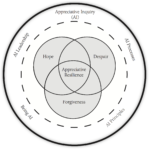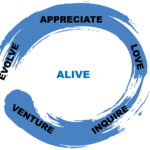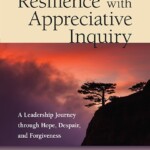Build a Resilience Practice with Appreciative Inquiry
We live in a complex and unpredictable world and are called upon again and again to help others be resilient and to be resilient ourselves. People often think of resilience as a response to weathering challenges but in appreciative resilience work the aim is to create a sustaining practice of resilience.
PROGRAM OVERVIEW:
This Appreciative Resilience Facilitator Training (ARFT) is designed for appreciative inquiry practitioners who want to deliver the Appreciative Resilience workshop and the ALIVE workshop for clients and colleagues and/or foster resilience informally with organizations, teams and individuals. It is also excellent facilitation training for those seeking to facilitate in complex situations.
In this facilitator training you will delve into the facilitation practices and considerations for delivering two powerful resilience processes: the Appreciative Resilience practice and the ALIVE model.
Both resilience processes are built from the practices of appreciative inquiry and are based upon the work and writing of Joan McArthur-Blair and Jeanie Cockell.
LEARNING OUTCOMES:
In this training practitioners will advance and deepen their skills in:
- Examining resilience research;
- Exploring the uses of Appreciative Inquiry in facilitating complex conversations;
- Facilitating the appreciative resilience workshop;
- Facilitating the ALIVE workshop;
- Building a personal Appreciative Resilience facilitation plan;
- Reflecting on worldview and how it influences the approach to facilitation;
- Incorporating a focus on justice, equity, diversity and inclusion into resilience conversations;
- Receiving and giving feedback on facilitation.
TRAINING SEGMENTS:
SEGMENT 1: EXAMINE
INVITATION: Examine the research and underpinnings of resilience and how it interweaves with appreciative inquiry.
DIALOGUE:
• Examine resilience research.
• Review the basics of Appreciative Inquiry.
• Identify key aspects of the ALIVE and Appreciative Resilience models.
• Reflect on facilitating in complex and challenging situations.
• Explore the uses of Appreciative Inquiry in complex and challenging situations.
SEGMENT 2: EXPLORE
INVITATION: Explore and use the ALIVE model for facilitating in challenging times.
DIALOGUE:
• Bring adult learning principles to facilitation.
• Examine the ALIVE model.
• Reflect on facilitator considerations.
• Facilitate sections of the ALIVE model.
• Give and receive feedback.
SEGMENT 3: PRACTICE
INVITATION: Explore and use the Appreciative Resilience model with individuals, groups, and organizations.
DIALOGUE:
• Explore Appreciative Resilience model elements & workshop formats.
• Facilitate sections of the resilience model.
• Give and receive feedback.
SEGMENT 4: INTEGRATE
INVITATION: Integrate elements of Appreciative Resilience into your personal facilitation practices
DIALOGUE:
• Analyze personal facilitation boundaries and considerations.
• Build a personal Appreciative Resilience facilitation plan.
• Consider how to integrate resilience into Appreciative Inquiry practices.
• Examine worldviews, justice, equity, diversity and inclusion in relation to facilitation practices.
PRE-REQUISITES:
To enroll in this course, participants must have at least one of the pre-requisites met:
- Appreciative Inquiry Facilitator Training from The Center for Appreciative Inquiry.
- Certification in Appreciative Inquiry from the David L. Cooperrider Center for Appreciative Inquiry.
- Other certifications will be considered on a case-by-case basis.
- Others without certification but with solid experience in appreciative inquiry practice will be considered.
ADDITIONAL COURSE INFORMATION:
METHOD OF DELIVERY
These live conversations will be delivered using Zoom. You can participate in these live events using a computer or tablet. You will receive the Zoom meeting information link and password closer to the start of the event.
CERTIFICATION - APPLIED PROJECT
In order to qualify for certification each participant will create a portfolio on how they are taking appreciative resilience out into the world. The portfolio can arise from creating and facilitating an event; providing a workshop; facilitating complex conversations; coaching; or other facilitation practice.
The portfolio might contain:
• Outline of what you have designed and facilitated;
• Images, video, agendas, themes, outcomes;
• Personal reflections on the experience.
The portfolio can be an info-graphic, video, written document, and/or other creative form. The portfolio is due 6 months after the program. Once certified, your Certification lasts for 2 years and includes:
• A Certification document for your records;
• Use of the Center for Appreciative Inquiry Certification logo to use on your website, email signature, etc.
• A profile listing on our Appreciative Inquiry Directory. Learn more about the benefits of our AI Directory.
Participants not seeking certification or certification renewal will receive a letter of participation from The Center for Appreciative Inquiry.
REQUIRED TEXTBOOK
This certification course utilizes the textbook, Building Resilience with Appreciative Inquiry: A Leadership Journey through Hope, Despair, and Forgiveness by our trainers Jeanie Cockell and Joan McArthur-Blair.
Your trainers will assign readings from this book throughout your training. You will need to purchase this textbook prior to the start of this course. This book is available in electronic or paperback versions
It is highly encouraged that you to read the textbook before joining the workshop.
QUESTIONS?
Do you have questions about this training? Please email your questions to Kathy Becker at Kathy@CenterForAppreciativeInquiry.net.
WANT TO TRAIN YOUR TEAM?
The ARFT can be delivered privately to a team, department, organization, or community and can be delivered in-person or virtually. We encourage a minimum of ten (10) members from any organization, group, or community participate. Please complete the CONTACT US form to learn how to bring a closed AI program to your team and organization.




